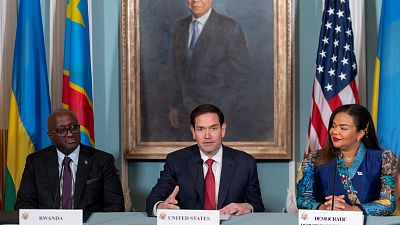Historic Peace Agreement Signed Between DR Congo and Rwanda
In a significant diplomatic development, the Democratic Republic of Congo (DR Congo) and Rwanda have come together to sign a long-awaited peace agreement in Washington, D.C. This peace deal has been met with optimism, as U.S. President Donald Trump heralded it as “a great day,” reflecting hopes for improved relations between the neighboring countries. However, analysts caution that challenges remain that could complicate the benefits of this reconciliation.
Background of Tension
The relationship between DR Congo and Rwanda has been historically fraught with tension, marked by conflicts that have had dire humanitarian consequences. The signing of this peace deal signifies a commitment to addressing longstanding issues, including border conflicts and security concerns that have plagued both nations. The hope is that this agreement will pave the way for stability and cooperation in the region.
The Deal’s Key Provisions
While the details of the agreement are still emerging, it is reported to include measures focused on security cooperation, economic partnership, and frameworks for resolving disputes amicably. Both governments are expected to mobilize resources for economic development, which can have pervasive effects on improving the livelihoods of citizens in both nations.
Potential Pitfalls
Despite the optimistic announcement, experts have pointed out potential pitfalls that the agreement may face, including:
- Implementation Challenges: Ensuring both parties adhere to the agreed terms may be difficult, particularly in regions where military factions remain active.
- Trust Issues: Historical animosities could resurface, hindering cooperative efforts and leading to skepticism among the populations regarding the deal’s effectiveness.
- External Influences: Regional actors with vested interests may attempt to disrupt the peace process, complicating the situation further.
Global Reactions
The international community has expressed its support for the peace agreement, with various countries and NGOs promising assistance in its implementation. While the U.S. administration remains optimistic, grassroots movements within both nations will play a crucial role in fostering a sustainable peace. Public sentiment will need to shift positively for the agreement to thrive.
Economic Context
This peace deal arrives at a time when both nations are grappling with economic challenges. Improved relations could lead to increased trade and investment opportunities, potentially benefiting both economies in the long run.
| Aspect | DR Congo | Rwanda |
|---|---|---|
| Political Stability | Fragile | Stable |
| Economic Growth Rate | 4.2% | 6.1% |
| Population (2023) | 102 million | 13 million |
Looking Forward
As the ink dries on this historic agreement, the world watches closely to see whether the commitments outlined will lead to lasting peace and cooperation in the region. Both nations have a fragile opportunity to build upon this moment, turning a page in their difficult relationship.




